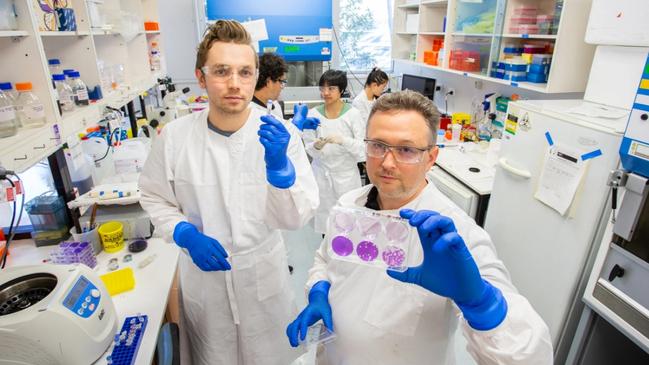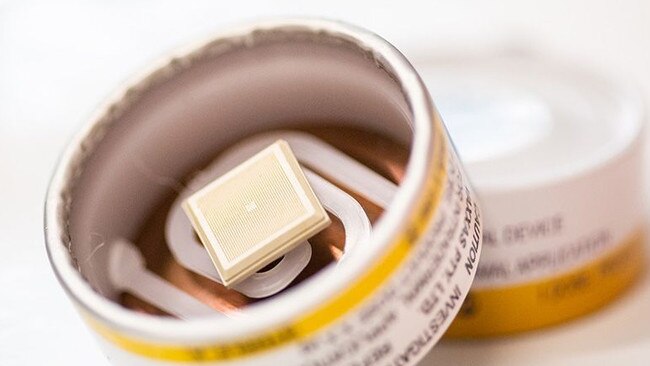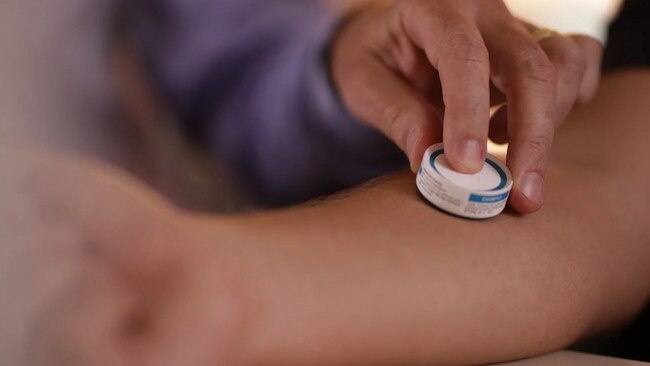Covid-19 vaccine patch developed by UQ scientists works better than vaccine in trials
Australians could be giving themselves Covid vaccines without a needle thanks to a “game changing” discovery by UQ scientists.

Coronavirus
Don't miss out on the headlines from Coronavirus. Followed categories will be added to My News.
We could soon be self-administering our own Covid vaccines without the need for a needle thanks to a “game changing” discovery by Australian scientists.
A Covid vaccine patch developed by Australian scientists has proven to be more effective than a needle at preventing Covid in mice, a new study that has yet to be peer reviewed shows.
Only a single dose was required and the patch worked to neutralise multiple Covid types including the more infectious UK and South Africa variants.
University of Queensland scientists are looking for funding to take the vaccine patch to human clinical trials. If successful, it could be on the market within two years.
“It’s a very simple device it’s very easy to apply, you don’t need trained medical staff,” said UQ researcher Dr David Muller.
“You take the applicator. Take off a foil seal, press it to the arm, it goes click and you leave it on for 10 seconds and you remove it and you are vaccinated.”

The patch delivers the vaccine into the skin using 5000 microscopic projections that cause no pain.
And it could completely revolutionise and speed up vaccine delivery — beyond the Covid jab — eliminating the need for vaccine appointments.
The vaccine is stable at up to 25 degrees Celsius for a month, making it much easier to distribute in areas where refrigeration can be difficult.
“We’ve shown this vaccine, when dry-coated on a patch, is stable for at least 30 days at 25 degrees Celsius and one week at 40 degrees, so it doesn’t have the cold chain requirements of some of the current options.” Dr Muller said.
“So in terms of being able to roll out a vaccine, you’re no longer beholden to the cold chain, the ease of delivery, all of those things are real game changers for a pandemic.”
The vaccine patch uses a sub-protein vaccine called Hexapro, which is similar in type to the Novavax vaccine Australia has purchased.
Hexapro was developed by scientists at the University of Texas but it has yet to be proven to work in human clinical trials.
Before it can be trialled in humans scientists will have to carry out toxicity studies in mice to check the vaccine is not toxic to animals.

If found to work, Hexapro could become a Covid-preventing candidate down the track, but it would need regulatory approval.
University of Sydney’s Professor Robert Booy who is the chief medical officer for Vaxxas — a company spun out of UQ which is developing the patch — said it was more effective than a needle because it used immune cells on the surface of the skin.
The tiny needles, pierce the epidermis or the upper dermis, where you’ve got a whole bunch of very good immune cells, which are scanning for foreign antigens,” he said.
“It means you deliver it to the sweet spot where the antigen presenting cells are waiting to find foreign things,” he said.
The research team has already tested the patch in humans to deliver the flu vaccine and trials are underway at the moment to test whether it works to deliver measles and rubella vaccines.
“The prospect of having a single-dose vaccine, that could be easily distributed and self-administered, would greatly improve global pandemic vaccination capabilities.” President and CEO of Vaxxas David Hoey said.
“This is one of the studies that we couldn’t have hoped for, to really go any better, we’ve really hit everything you would want from a study,” Dr Muller said.





